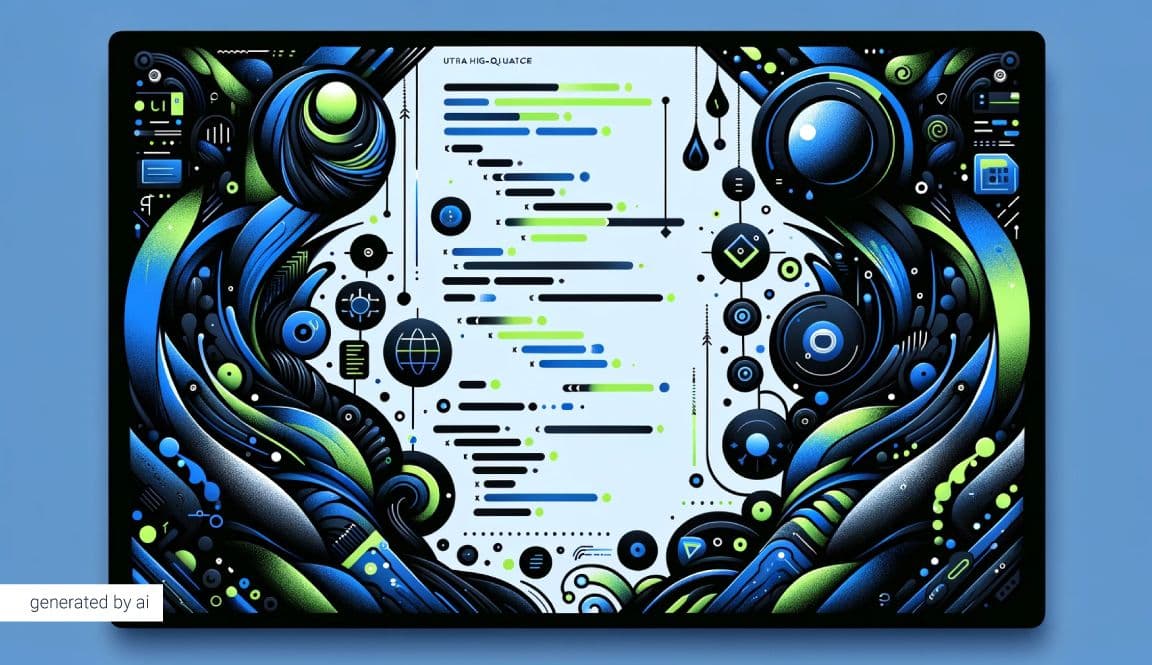
What is Clean Code?

In the world of software, the quality of code is measured not only by what it does but also by how it is written. Code that adheres to the principles of "Clean Code" is an excellent example of these criteria. Beyond being merely functional, clean code signifies code that is understandable, maintainable, and manageable, embodying both aesthetic and functional values like a work of art. If you're curious about the fundamental principles of clean code, its importance, and how it can be applied in the software development process, and if you want to overcome the challenges encountered while coding, facilitate the maintenance and updating of code, and most importantly, enhance the quality of the software, you can benefit from the tips we will provide now.
What Does Clean Code Mean?
Known as the cornerstone of quality in the software development process, clean code, popularized by Robert C. Martin, emphasizes the readability, understandability, and ease of maintenance of code. Clean code is written in simplicity and elegance, in such a way that any software engineer can quickly understand and work on it. It means that beyond the code just being operational, it should also be easily understandable and extendable for future developers. Writing clean code increases the sustainability of software and reduces complexity. This aims at lowering the likelihood of errors while targeting an increase in efficiency.
Clean code focuses more on the quality of the code itself rather than the performance of the software. The approach facilitates the reusability, testability, and integration of code. On the other hand, adopting the principles of such code fosters better collaboration among teams. Writing the code in a clear and consistent manner allows different members of the team to understand and work on the code more comfortably.
What Are the Principles of Clean Code?
The principles of clean code are guidelines that must be followed to achieve excellence in the software development process. Foremost among these principles is the "KISS" (Keep It Simple, Stupid) principle. This principle advocates for keeping the code as simple and understandable as possible by avoiding unnecessary complexities. Another important principle is "DRY" (Don't Repeat Yourself), which emphasizes the prevention of code duplication and the necessity of creating reusable components. This facilitates easier maintenance of the software and reduces the risk of errors.
Another principle of clean code is "YAGNI" (You Aren't Gonna Need It), which opposes the addition of unnecessary features to the code. Thus, developers focus only on current requirements. Another crucial aspect of such code is its testability. Testable code means that errors can be detected and corrected at an early stage, which enhances the overall quality of the software. The final fundamental principle of clean code is good documentation and meaningful naming. This principle, which clearly expresses the intent and structure of the code, makes the code more extendable by other developers.
What Are the Values of Clean Code?
In the software development process, aimed at increasing quality and efficiency, the fundamental values of clean code start with "understandability." It conveys to the reader clearly and precisely what the code does. The readability of the code saves developers' time by allowing them to work efficiently on it rather than spending time trying to understand it. The second value is simplicity. Maintaining the simplicity of the code by avoiding unnecessary complexities not only makes it easier to maintain but also reduces errors. In other words, clean code discourages unnecessary comments, unused variables, and complex structures in favor of functional and simple constructions.
The third value is modularity. Clean code, by organizing functionality into logical modules, increases the reusability of the code and makes the overall structure more manageable. The fourth value is known as continuous improvement. Clean code, which supports improvement with continuous renewal, is important for adapting to changing requirements over time after it has been written and for enhancing its performance. Thus, a sustainable development process is encouraged, preventing the code from becoming outdated over time.
Why Is Clean Code Important?
Clean code plays a crucial role in the software development process, with one of its most important functions being to facilitate maintenance and development processes. Software development is an ongoing process that involves maintaining and updating the code that has been written. Clean code simplifies all these processes, making them less time-consuming, which is especially important in large and complex projects.
Another significance of clean code is its ability to reduce the rate of errors. Clean and well-organized code makes it easier to detect errors and then correct them. This is one of the fundamental actions that enhance the reliability of the software. The third importance of clean code is its improvement of teamwork and collaboration. The practice of writing clean code creates a consistent coding standard among team members, increasing efficiency in teamwork. Code that everyone can read and understand allows new team members to adapt more quickly to the project. The fourth and perhaps most important benefit of clean code is its provision of long-term efficiency and sustainability. In other words, since it lays a healthy foundation for the software project, everything built on this foundation enhances the quality and durability of the entire project. Clean code's flexible structure, which extends the life of the software, requires less time due to its adaptability to adding new features or updating existing functionality. This allows for the continuous development and adaptation of the project.
Another significant feature of clean code is its facilitation of software adaptation to innovations. As technology continuously evolves, software projects need to keep up with these changes. A clean, well-structured, and modular codebase makes the transition to new technologies, libraries, and tools easier. Especially in the fast-changing world of technology, these coding principles, which are critical for maintaining a competitive advantage in software, work compatibly with modern software development practices like automated testing and continuous integration. These practices keep the quality of the software continuously under control, making the development process more predictable and reliable. In the end, clean code practices enable the emergence of more reliable software solutions by increasing efficiency and effectiveness at every stage of the software development process, from design to testing, deployment to maintenance. These practices are not only essential for current projects but also for adapting to future technological advancements and market needs.
What Are the Advantages of Clean Code?
Using clean code provides significant advantages at every stage of the software development process. These practices, which enhance the quality, sustainability, and efficiency of the code, offer benefits to both developers and end-users. Some of the key advantages of clean code can be summarized as follows:
- Clean code has a clear structure, which allows developers working on the code to grasp the purpose of functions and algorithms more quickly.
- Clean and well-structured code greatly facilitates the maintenance process. The detection and correction of errors take less time.
- By reducing the likelihood of making mistakes, clean code, as structured and clearly documented code pieces, prevents misunderstandings and thereby errors.
- Clean code facilitates the writing and implementation of automated tests. This ensures the software's quality is continuously monitored.
- It makes it easier for the software to adapt to future requirements and technologies.
- Less faulty, faster, and more reliable software increases end-user satisfaction. This process, which contributes to brand loyalty, also allows for the expansion of the customer base.
- Clean code, carrying understandable modularity, makes the development process more efficient and allows for faster integration of new features.
- Clean code practices generally lead to higher quality software products. This increases the satisfaction of both developers and end users.
How to Write Clean Code?
When writing clean code, extra attention must be paid to certain aspects. If we were to categorize them into headings, they could be stated as follows:
Naming
- Names given to variables, functions, classes, and other elements should clearly indicate what they are for. For example, instead of using 'a', use meaningful names like 'customerOrderCount'.
- Abbreviations and technical jargon decrease the readability of the code. Names should be as clear as possible.
- Avoid using small 'l' and capital 'O' as they can easily be confused with the numbers zero and/or one.
- Names like x1, x2, x3 do not clearly indicate what they are for. Each variable and function should serve a specific purpose.
- To facilitate searching within the code, avoid generic or very short names. Use clear names like NUMBER_OF_TASKS.
- Function names should clearly indicate what the function does. For example, functions like calculateTotal() or deleteRecord() could be more meaningful names.
- Names can be short as long as they are understandable. However, clarity should always be prioritized.
Use of Conditions
Conditions can affect the readability and maintainability of the code. To use conditions effectively, the following should be considered:
- Conditions should be written to follow the natural flow of everyday language. For example, if (age < 18) is a natural expression.
- Conditions should be written with positive expressions. if (isActive) should be preferred over expressing a negative condition like if (!isInactive).
- Nested expressions complicate the code. To simplify these situations, logical operators or early exits can be used.
- The order of conditions matters. Conditions that change infrequently or are more significant should come first.
Loops
Loops play a critical role in controlling the flow of a program. To optimize loop usage for clean code, consider the following:
- You should avoid the do/while structure. This type of loop can be confusing in terms of readability. The while loop is often a more understandable alternative.
Use of Comments
Comments are used when the code is not self-explanatory. However, excessive use of comments can also lead to problems. For this reason, you should pay attention to the following aspects:
- Code should explain itself. If you find yourself writing a lot of comments, you should consider making your code clearer.
- Comments that provide incorrect information are more harmful than having no comments at all.
- Comments can be useful for understanding difficult algorithms or complex processes.
Functions
Functions are the fundamental building blocks of code. For good function writing, functions should be short and focused. The main points to consider are:
- Each function should do only one thing. This approach makes functions easier to test and understand.
- Names should clearly reflect the purpose of the function. In this context, the name you choose should clearly indicate the task the function performs.
If you're looking to claim your spot in the world of software and achieve new successes in your career, Techcareer is waiting for you! At Techcareer, you can discover career opportunities that will carry you towards your goals. You can also participate in our Bootcamp programs conducted under the guidance of our expert trainers, who will take significant steps towards making a difference in the industry. You can improve your software skills and, most importantly, learn the nuances of writing Clean Code. On the other hand, if you want to unleash your creativity and share your innovative ideas, our Hackathon events are just for you. At the events, seize the opportunity to showcase your skills and make your name known in the software world with Techcareer, and realize your career goals!



